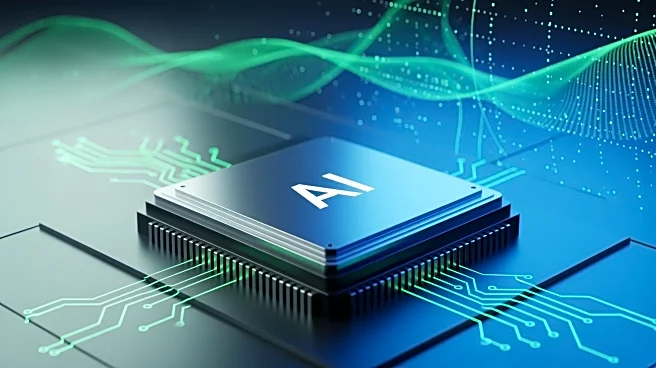What's Happening?
Nvidia CEO Jensen Huang recently made headlines with his comments at the Financial Times' Future of AI Summit, where he suggested that China is poised to win the AI race due to lower energy costs and fewer
regulations compared to the U.S. However, Huang later issued a softer statement, emphasizing that China is only 'nanoseconds behind America in AI' and underscoring the importance of the U.S. maintaining its lead by supporting developers globally. Huang's remarks come amid ongoing tensions between the U.S. and China over AI chip exports, with Nvidia's access to the Chinese market currently restricted due to a national security review by Beijing. This situation follows previous discussions between Huang and President Trump, where some chip export restrictions were eased.
Why It's Important?
The comments by Jensen Huang highlight the competitive dynamics in the global AI industry, where the U.S. and China are vying for technological supremacy. Huang's initial statement underscores concerns that the U.S. might lose its edge in AI development due to regulatory hurdles, while China's supportive policies for local developers could accelerate its progress. The restriction on Nvidia's market access in China also reflects broader geopolitical tensions affecting tech companies, with potential implications for U.S. businesses reliant on Chinese markets. The situation could influence future trade negotiations and policies regarding technology exports, impacting stakeholders in the AI and semiconductor industries.
What's Next?
As Nvidia's access to the Chinese market remains uncertain, the company may need to explore alternative strategies to maintain its growth trajectory. This could involve lobbying for further easing of export restrictions or seeking new markets outside China. Additionally, the ongoing national security review by Beijing could lead to further developments in trade negotiations between the U.S. and China, potentially affecting other tech companies. Stakeholders in the AI industry will be closely monitoring these developments, as they could have significant implications for global AI competition and collaboration.
Beyond the Headlines
The situation with Nvidia and China's AI race also raises ethical and strategic questions about the balance between national security and technological advancement. The restrictions on AI chip exports reflect concerns about the potential military applications of advanced technologies, highlighting the need for careful policy considerations. Moreover, the competitive pressures in the AI industry could drive innovation but also exacerbate geopolitical tensions, necessitating dialogue and cooperation to ensure responsible development and use of AI technologies.










